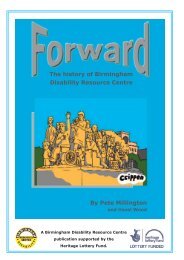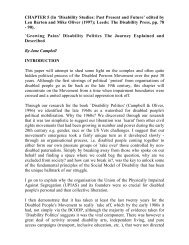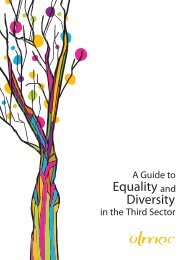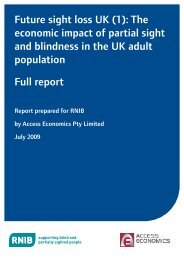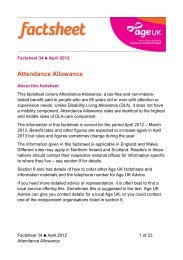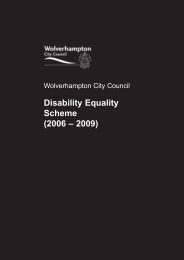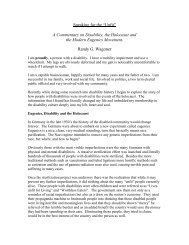What equality law means - Birmingham Disability Resource Centre
What equality law means - Birmingham Disability Resource Centre
What equality law means - Birmingham Disability Resource Centre
You also want an ePaper? Increase the reach of your titles
YUMPU automatically turns print PDFs into web optimized ePapers that Google loves.
For example:<br />
The male worker who complained in the previous example must not be treated badly<br />
because of his complaint. This <strong>means</strong> that if there is a need to discipline him again,<br />
the same action must be taken against him as would be taken against someone who<br />
had not complained. To protect themselves against allegations of victimisation, the<br />
employer will find it helpful if they can demonstrate that procedures have been<br />
applied consistently; keeping records of what has been done in every disciplinary and<br />
grievance procedure will help with this.<br />
Reasonable adjustments for disabled workers<br />
If a worker is a disabled person, you must make reasonable adjustments so that they can<br />
participate in the disciplinary procedure, as far as is reasonable, to the same standard as a<br />
non-disabled person. This is especially important when it comes to completing and/or<br />
reading documents and attending meetings. For example, they might need:<br />
• Documents provided in a different format – perhaps on audio CD, or in large print or in<br />
Braille, for people with a visual impairment.<br />
• Meetings to be held in an accessible room, for people with a mobility impairment.<br />
• A British Sign Language (BSL) interpreter if they are a Deaf person who uses BSL.<br />
• Someone to help them complete a form if they have dyslexia.<br />
• A personal assistant with them, in addition to their ‘official companion’ (the trade union<br />
representative or colleague who may address the meeting for them, if they decide to<br />
have one). They may need a personal assistant for this situation even if they do not<br />
normally use one at work.<br />
• Changes to the process, such as more breaks to ask for an explanation from their<br />
official companion, if they have a learning disability.<br />
You must also think about whether you should make reasonable adjustments to the<br />
standards you apply to workers where these standards place disabled workers at a<br />
substantial disadvantage compared to people who are not disabled.<br />
28




